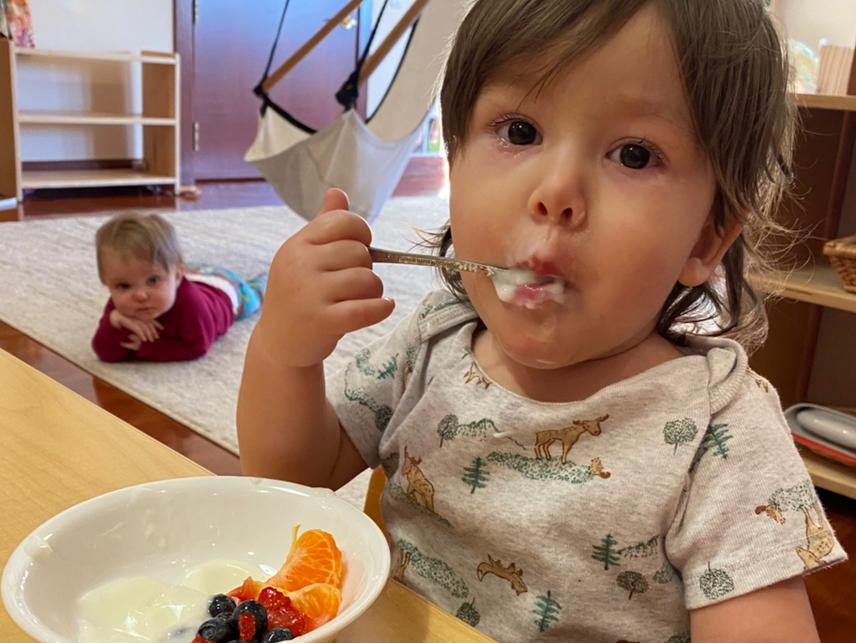
7 minute read
School Day
The Infant program is 5 full days, Monday through Friday of each week. Before and After Care are available every school day, but hours are subject to change as deemed appropriate by OFMS administration. The Infant program is closed every other Friday. Please refer to the school calendar for specific classroom closure dates.
Classroom hours: 8:00 am to 4:30 pm
Before Care: 8:00 am to 8:30 am
Full-Day Arrival: 8:25 am to 8:45 am
Full-Day Dismissal: 3:15 pm to 3:30 pm
After Care: 3:30 pm to 4:30 pm
Arrival
Upon arrival at school, please enter the environment from the cubby area. A staff person will meet you at the cubby area to receive your child. You are permitted to leave your child’s car seat in this area for the duration of his/her day. We ask that you not come into the room unless invited because some children may be experiencing stranger anxiety. While in the cubby room, please keep in mind that the cubby room is part of the environment, and quiet voices are necessary. Around the age of 12 months, your child will develop the desire to become independent with the removal of his/her outerwear and want to take on this task alone. Assist your child as little as possible with the removal of his/her outerwear. We are happy to help guide you through this developmental process with your child.
It is important that you not linger nor surreptitiously leave the room. Make certain that your child is aware you are leaving by saying good-bye and waving to him/her. This helps your child develop trust in you and in us. If your child cries, it is likely he/ she will stop in a few moments. If you would like to check on your child later, please call the school.
Dismissal
When you pick up your child at the end of the day, park your car in the parking lot of the Victorian Farmhouse and proceed to the Nido cubby room. A teacher will greet you at the door. While in the cubby room, please keep in mind that the cubby room is part of the environment, and quiet voices are necessary. Please sign your child out at the Sign Out Notebook located by the cubby door. In Nido, we will make certain that your child’s needs have been met before dismissal. If you are not going directly home from school, please inform us ahead of time so that we may assist in meeting your child’s needs to facilitate those plans.
Attachment
It is very important for children to form attachments to parents, family members, and their caregivers. Please do not be offended if your child occasionally wants us to hold him/her instead of you. It is perfectly normal at this age and is an important part of development.
Clothing & Shoes
Please send your child to school in shoes and clothing that allow successful independence for both dressing and personal hygiene. Children need to dress and undress themselves as many times as they feel is necessary. They will also need closed-toed shoes they can slip on and off—no Crocs please. Children who cannot yet snap or buckle are to wear elastic-waist pants and no belt. Overalls are “cute,” but young children often do not yet have the skills to manipulate the buckles. During the school day students will have lessons in dressing skills that include zipping, snapping, and buttoning to help them with this independence. When your child chooses clothing for the day, please keep in mind weather and school activities. Weather and temperature may change throughout the day and necessitate different sorts of clothing. Also, please keep in mind that students do often “wear their work” and need additional clothing available for these times. Once your child can stand, please transition from clothing that snaps to separate tops and bottoms.
All articles of clothing should have your child’s name labeled on them in permanent marker. Knowing which items belong to whom by proper labeling will allow the children to develop independence and selfconfidence.
We shall inform you when your child’s supply of clothing or toiletries runs low and needs restocked.
Please note that faculty will use insect repellent and sunscreen on your child when going outdoors. We ask that you notify the teachers if your child has an allergy to any of these items.
Bottle Feeding
We respect and support families’ feeding choices, whether we are giving formula or breastmilk. We simply ask you to supply milk and bottles sufficient for your infant’s needs, either daily or in bulk. We have cabinet storage as well as refrigerator and freezer space. If you would like to bring breast milk to school for your child, please bring it in containers that hold no more than the amount of milk the child would drink at one feeding. To uphold the quality of your breastmilk, we strive to maintain the following standards. We will discard breast milk that does not meet this criteria.
• Milk must be brought to the school in sterilized bottles or disposable nursing bags.
• Please label each container with the child’s name, the date collected, and the amount in ounces.
• When transporting milk to school, it must be either already frozen or in a cooler with ice packs to keep the milk at 45 degrees or below.
• Refrigerated breast milk must be used within 72 hours of the time expressed. We will not keep milk in the refrigerator for longer than three days.
• Frozen breast milk can be stored in our freezer for up to six months.
• Once the bottle is fed to the child, any remainder must be discarded after 60 minutes and cannot be returned to the refrigerator.
It is expected that the child is fully able and willing to take a bottle during the school day. We will not, at any time, allow a breast-fed child to go without eating because they refuse a bottle. If refusal continues for over 4 hours, then the child will be immediately excused from school for a period of time until the family can display that the child will take nourishment from a bottle.

Solid Foods
As your child’s nutritional needs develop, you will be bringing foods from home for your child. When selecting a lunch box for your child, please avoid multi-sectioned, compartmented lunch boxes, hard-sided coolers, or any lunch box with a “character” on it. We prefer an insulated lunch box with your child’s name written clearly and permanently on the top. OFMS will supply dishes, utensils, and cups that are sterilized after each use. We are able to refrigerate and reheat meals in our classroom. Open containers of perishable foods can be kept at school for 24 hours. We also have some cupboard space to store food items for each child.
A balanced lunch should be brought from home daily. Nutritional choices include child-sized portions of fruit, vegetables, protein, whole grains, and low-sugar dairy products. Please avoid highly processed foods, such as macaroni bowls, or fast food items. We ask that you monitor closely all the dyes, additives and preservatives in the food your child eats. Please also keep high-sugar foods such as candy or cookies at home. If students bring non-nutritional items to school, we will simply refrain from offering them at school and send them back home. The USDA’s website offers recommendations and guidelines to assist you in making the best choices, if you would like more information.

Discipline
We practice positive discipline at OFMS. To discipline in the Nido means that we are going to make every attempt to redirect your child to another activity if they behave in a way that is not appropriate. We strive to create a space that allows for safe exploration and freedom of movement. When adults intervene, it is mainly with distractions or redirections. We believe it is important to save “no,” for times when it becomes truly necessary. This would occur if the child is in obvious danger or is putting another child in an unsafe situation. For example, we do not allow children to crawl on shelving. We will redirect the child to a climbing activity. If a child moves as if to throw a dish, we would stop them and perhaps ask, “Would you like to throw?”, then walk them to a basket of beanbags. It is almost certain that at some point your child will be bitten, hit, or possibly injured by another child or a situation in the environment. Please understand that we cannot share with you who caused the injury. We must respect the privacy of the other child. The important thing is that we handled the situation in an appropriate manner, and with the utmost respect for each child involved.
Sharing vs. Taking Turns
It is a misconception that children this age share. Children in the Nido do not yet understand the concept of sharing. We will, however, encourage them to take turns if they are involved in an activity that calls for sharing, and, of course, no matter what the activity, we always encourage the children to interact in a peaceful manner.

Napping
By six months of age, nighttime feedings are usually not necessary, and many infants sleep through the night; 70-80 percent will do so by nine months of age. Infants typically sleep 9-12 hours during the night and then nap anywhere from 45 minutes to two hours, one-to-three times a day—fewer as they reach age one. When infants are put to bed drowsy but not asleep, they are more likely to become “self-soothers,” which enables them to fall asleep independently at bedtime and put themselves back to sleep during the night. Those who have become accustomed to parental assistance at bedtime often become “signalers” and cry for their parents to help them return to sleep during the night.
Sleep Tips for Infants (3-11 months):
• Develop regular daytime and bedtime schedules.
• Create a consistent and enjoyable bedtime routine.
• Establish a regular “sleep-friendly” environment.
• Encourage your child to fall asleep independently and to become a “selfsoother.”
By the age of two, most children have spent more time asleep than awake, and, overall, a child will spend 40 percent of his/ her childhood asleep. Sleep is especially important for children as it directly affects mental and physical development.

According to Dr. Maria Montessori, “a child needs peaceful sameness in order to construct his inner life” (The Child in the Family).
Your child will rest on a floor bed during the day. We ask you to be consistent at home with the child’s sleep schedule. Give your child a schedule that is predictable and includes the same activities and time each night for him/her to build trust in you. Support items for sleeping are not needed and get in the way of the child’s development. It is our responsibility as adults to aid in the growth of the child’s three developmental areas—emotional, social, and physical—and if you follow these recommendations, your child will develop a greater trust in you and also love going to sleep.
Birthday Parties
We refrain from celebrating birthdays in the Nido. At this age, the child is not yet aware of his/her special day. If you would like to honor your child on his/her birthday, we might suggest giving a book to the Nido in your child’s name. You are encouraged to discuss options with the Nido staff.



